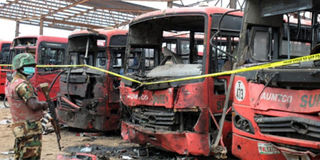Boko Haram militants prove a hard nut to crack for Buhari

The aftermath of a recent Boko Haram terror attack in Kano City, Nigeria. PHOTO BY AFP
Abuja- The Boko Haram insurgency is proving to be a bigger problem than the new Nigerian government may have thought.
Despite several measures being put in place, the terror group continues to wreak havoc in the northern part of the country, with Plateau State being the latest to be hit.
Two bomb attacks on Jos, the state capital last Sunday, caused the deaths of at least 47 people.
The Jos casualty figures were released by the National Emergency Management Authority (NEMA) on Monday.
NEMA said no fewer than 120 were injured in the two incidents.
The attacks came as Nigeria mourned the deaths of 36 others killed in some parts of northeast early last Sunday.
The first Jos bombs hit a mosque at Delimi, killing 27 people and the second went off five minutes later at a restaurant in Bauchi ring road, killing 20 people.
Thirty-six people were killed in attacks in Birnin-Magaji local government area of Zamfara and Potiskum in Yobe State between Saturday and Sunday.
The targets included a church in Potiskum where six worshippers were killed.
The public relations officer of the Plateau State Police Command, Mr Emmanuel Abu, said the incidents were being investigated and the police would soon release the findings.
President Muhammadu Buhari on Monday expressed sadness over the latest attacks.
A statement issued in Abuja by the special adviser on media and publicity, Mr Femi Adesina, said President Buhari deeply regretted the unfortunate loss of lives in the attack.
“The President wholly condemns the resumption of attacks by terrorists on places of worship-- which are highly revered places of prayer and communion with God for most Nigerians.
Nigerians are a very religious people and President Buhari believes that the terrorists who wantonly attack our places of worship have wilfully declared war on all that we value, and must, therefore, be confronted with all our might and collective resolve,’’ the statement said.
Senate President Bukola Saraki described the attack on worshippers as worrisome.
The senate president’s media office in Abuja told the Boko Haram insurgents to “stop wasting innocent lives and accept the olive branch presented by the federal government’’.
“Sending Nigerians to untimely grave can never be the solution to any religious, political or economic grievances.
Besides, the Federal Government has demonstrated enough political will to engage any group in dialogue aimed at bringing these vicious and sad attacks to a final stop,” the senate president’s media office said.
Dealing with the Boko Haram menace was one of the promises President Buhari made to Nigerians on his inauguration on May 29.
He has since held meetings with the leaders of neighbouring Chad, Niger, Cameroon and Benin, leading to the creation of the Multi-National Joint Task Force (MNJTF) to combat the Boko Haram menace.
Last month’s Abuja summit created an 8,700-strong regional force involving the five countries to replace an ad hoc coalition of Nigeria, Niger, Chad and Cameroon.
The earlier force came into being after Chad’s President Idriss Deby sent troops to assist their Cameroonian counterparts against a wave of attacks by the Islamist militants.
President Buhari did indicate that the MNJTF soldiers would not be restricted in terms of movement.
The MNJTF, to be deployed from July 30, will be headed by a Nigerian officer, with his deputy from Cameroon for an initial 12 months.
President Buhari also moved the Military Command and Control Centre (MCCC), code-named “Operation Zaman Lafiya”, to Maiduguri town to coordinate the fight against the insurgents.
Lobby group, the Arewa Consultative Forum (ACF), a northern socio-political elite organisation, expressed concern about the recent attacks.
A statement on Monday in Kaduna by the National Publicity Secretary, Mr Muhammad Ibrahim, described the attacks and killings by the insurgent group as worrisome.
“ACF is worried and, indeed, Nigerians are worried and disturbed with the recent and frequent attacks on villages and even states capital of Borno and Yobe by the Boko Haram insurgents.
The renewed direct attack on the people in the Monguno, Kukawa, Maiduguri and many villages in Borno, Yobe and Adamawa and Plateau states is cruel, barbaric and condemnable especially in the holy month of Ramadan,” Mr Ibrahim said.
He added that the latest trends showed that the Boko Haram insurgents were a cult in form, character and operation as their claim to be Muslims was untenable.
“Islam enjoined Muslims not to fight during the month of Ramadhan no matter the provocation, “ it said
Meanwhile, the residents of Maiduguri on Monday cautioned the government against rushing into dialogue with the Boko Haram.
They advised the federal government to concentrate on the military action instead.
Mr Musa Usman, a Maiduguri-based Islamic scholar, advised the government to equip the military with weapons to face the insurgents rather than considering dialogue.
“We heard that the government was considering a dialogue option with the insurgents following the recent spate of attacks in the north east.
“Why should government dialogue with individuals who are only interested in killing and maiming innocent people?” Usman asked.
Another scholar, Malam Goni Yahuza, said negotiating with the insurgents was a sign of weakness. “I do not support the idea of dialogue with Boko Haram because there is nothing to dialogue about.’’
Alhaji Mohammed Mala, a businessman, commended the efforts of the Nigeria military in fighting insurgents and urged them to do more.
Africa Review




